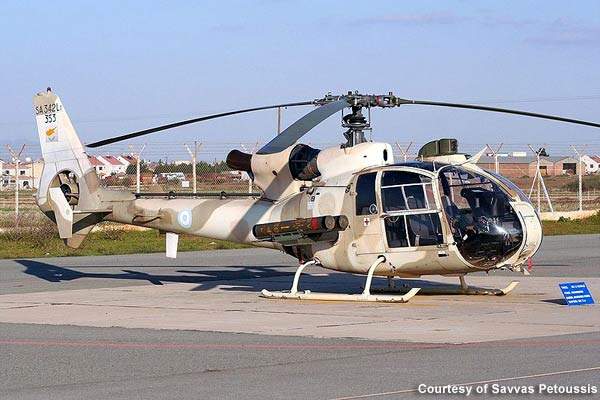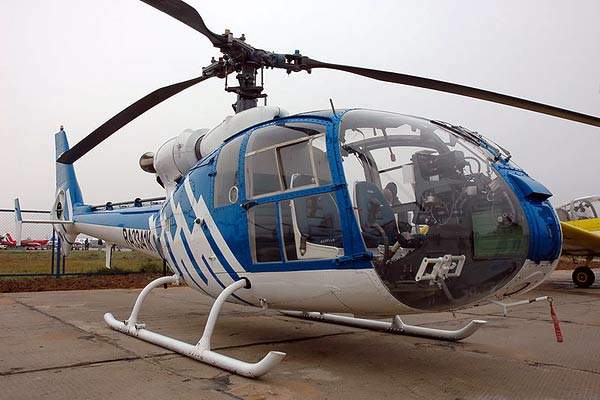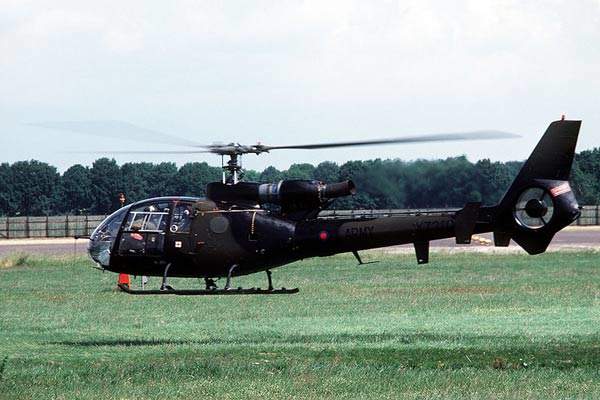The Gazelle helicopter (SA 341 / SA 342) is a multi-purpose, lightweight utility / attack helicopter manufactured by Aerospatiale Helicopter Corporation, France. It is one of the fastest helicopters and serves several branches of the British Armed Forces including the Royal Air Force, Royal Navy, Army and Royal Marines in various applications.
The helicopter is used in approximately 23 countries, primarily for surveillance and reconnaissance. It is also used for military applications such as attack, anti-tank, anti-helicopter, transport and training. It can accommodate one pilot and four passengers.
Gazelle helicopter variants
The Gazelle’s variants include the SA 341B, SA 341C, SA 341D HT3, SA 341E, SA 341F, SA 341G and SA 341H. The SA 341B is also known as the Gazelle AH Mk 1. It was principally designed and developed for the British Army and is equipped with an Astazou IIIN engine. It also has a Nightsun searchlight and Decca Doppler 80 radar.
The variant entered into service in 1973. The SA 341B served the British Army in conflicts in the Falkland Islands, Kuwait, Iraq and Kosovo. The SA 341C is a trainer helicopter primarily used by the British Army for training Royal Navy pilots. The first helicopter was introduced in July 1972. About 30 have been manufactured.
The SA 341D HT3 is a training variant specifically constructed for the Royal Air Force.
About 14 have been manufactured. The first was delivered on 16 July 1973. It is equipped with the same engine as the SA 341C variant.
The SA 341E, also known as HCC4, is used for communication and VIP transport. One of the helicopters was developed for the Royal Air Force. The SA 341F is an advanced version of SA 341E. It was developed for the French Army. The helicopter is equipped with an M621 20mm cannon and powered by an Astazou IIIC engine.
Another variant, the SA 341G, is the first helicopter to be certified by the US for operations under IFR Cat.1 conditions with a pilot. It is a civil and commercial variant powered by an Astazou IIIA engine and is also called the Stretched Gazelle.
The military variant SA 341H is an advanced version of SA 341G and is powered by an Astazou IIIB engine.
Fenestron / fantail tail rotor
The SA 341 is the first helicopter to be fitted with a fenestron or fantail. The fenestron is a shrouded tail-rotor that enhances flight characteristics at high speed and reduces noise. The helicopter also features a round, glassed-in cockpit, three main rotor blades and 13 fenestron blades in the tail rotor.
The three main rotor blades are mounted on top of the fuselage at the back of the cabin and are made from composite materials.
The Gazelle proved unsuitable for operations in Afghanistan because of the hot and dry climate. In Afghanistan SA341s cannot fly between 11am to 11pm during summer because heat can damage the engines.
Development
British interest in a utility helicopter led to the development of the Gazelle. In February 1967 the British Army signed a contract with Westland Helicopters for the Gazelle’s development.
Westland and Aerospatiale formed a joint venture in 1968 to develop the helicopter. The Gazelle made its maiden flight on 7 April 1967. Westland completed the final assembly of SA 341 in 1970.
The SA 342M, SA 341F and Gazelle Viviane were developed for surveillance and reconnaissance.
The SA 342 series made its first flight in 1976. A state-of-the-art anti-tank helicopter, Gazelle Viviane is equipped with a Viviane thermal imagery system, designed to capture images on battlefields.
Avionics
The SA 341’s avionics include general instruments, standby magnetic artificial horizon, slip indicator, Bendix / King SM-4001 moving map, global positioning systems (GPS), King KI-825 EHSI Kit, King KRA-10A radar altimeter kit and Garmin GNS-430 NAV / COMM / GPS.
It is also equipped with King KX-165A NAV / COMM, a Bendix / King KT-76C transponder and a Garmin GMA-340H audio panel.
The Gazelle has direct voice input (DVI) systems that control avionics instruments through aircrew helmet microphones and an intercom. The DVI system is manufactured by QinetiQ. It also has an infrared signature suppressor.
Armament
The SA 341 is equipped with a GIAT M621 20mm cannon, four AT-3 ATGMs and two SA-7, 128mm or 57mm rockets and a 7.62mm machine gun in cabin.
The GIAT M621 is an automatic 20mm cannon manufactured by Nexter for helicopters and armoured vehicles. The length and width of the M621 cannon are 2,207mm and 202mm respectively. The height and weight are 245mm and 45.5kg respectively.
The AT-3 ATGM is an anti-tank guided missile used to demolish heavily armoured tanks and fighting vehicles. The SA-7 is a low-altitude surface-to-air missile system. The length and diameter of the SA-7 are 1.44m and 72mm respectively.
Engines
The Gazelle is powered by a Turbomeca Astazou IIIA turboshaft engine. The engine generates about 440kW of output power. The Astazou IIIA engine is primarily used for civil and military applications.
Performance
The Gazelle can climb at a rate of 12.2m/s. The helicopter has a cruise speed of 264km/h and can fly at a maximum speed of 310km/h. The range and service ceiling of the helicopter are 500 miles and 20,000ft respectively. The maximum take-off weight of the helicopter is 1,800kg, while the endurance is 3.5h.







